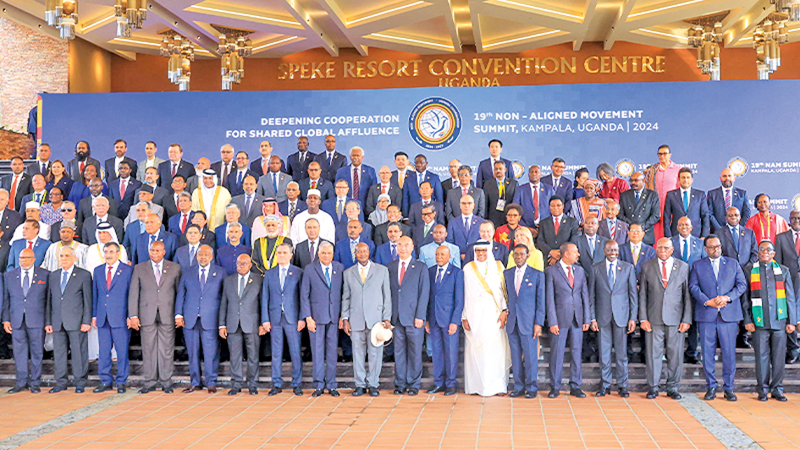President Ranil Wickremesinghe’s leadership in Sri Lanka has gained international attention, impressing not only with his vision for economic recovery but also his ability to translate that vision into tangible results.
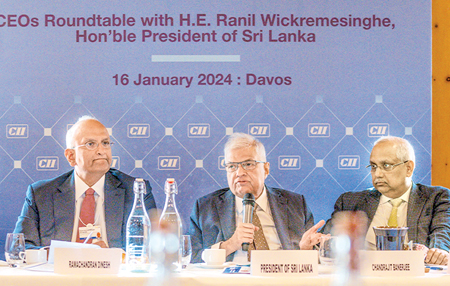
President Ranil Wickremesinghe at the Indian CEOs
Roundtable Discussion in Davos
Amid Sri Lanka’s worst economic crisis in 2022, global headlines painted a bleak picture, casting doubt on the nation’s future. Despite this, a defiant spirit emerged; fuelled by the belief that escape was not only possible but could serve as a beacon for other developing nations. This determination resonated deeply with African leaders, many of whom sought President Wickremesinghe’s insights in bilateral discussions.
Seizing this crucial moment, President Wickremesinghe embarked on a series of talks with African leaders and representatives from the Global South. Leveraging the occasion, he participated in essential discussions, aiming to reinvigorate, expedite, and amplify Sri Lanka’s foreign and economic initiatives in Africa.
Beyond broader discussions, the President engaged in targeted dialogues with leaders like Ugandan President Yoweri Museveni, South African President Cyril Ramaphosa, and Tanzanian Prime Minister Kassim Majaliwa. These focused conversations explored specific initiatives for deepening bilateral cooperation in areas of mutual interest, further solidifying Sri Lanka’s relations with these key partners.
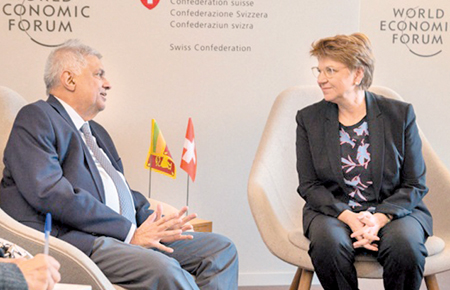
President Ranil Wickremesinghe holds talks with
Swiss President Viola Amherd
The Ugandan President specifically lauded Sri Lanka’s progress, attributing it to President Wickremesinghe’s decisive leadership in reviving the nation’s ailing economy. This sentiment was echoed by numerous African heads of state who voiced their admiration for President Wickremesinghe’s dual commitment: boosting Sri Lanka’s domestic standing and bolstering relations with the African continent.
Following his attendance at the World Economic Forum in Switzerland, President Wickremesinghe embarked on a two-day official visit to Uganda. There, he participated in the Non-Aligned Movement (NAM) summit and the South Summit of the Group of 77 + China, receiving significant commendation for his efforts in rebuilding Sri Lanka’s economy and fortifying ties with Africa.
World Economic Forum
The World Economic Forum (WEF) is an annual event held in Davos, Switzerland, bringing together political, business, Government, civil society, and academic leaders to discuss global issues and find solutions.
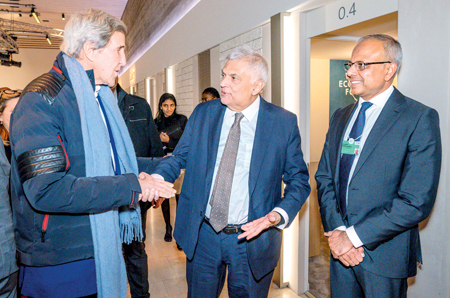
Meeting US Climate Envoy and former Secretary of
State John Kerry
President Wickremesinghe graced the main forum, significantly enhancing Sri Lanka’s visibility. He delivered a keynote speech at the Green Tech Forum, hosted by the Swiss-Asian Chamber of Commerce. Titled “Paving the Way to an Energy Secure Sri Lanka,” his address highlighted the nation’s burgeoning opportunities in renewable energy. This captivating presentation grabbed international attention, propelling Sri Lanka’s promising green sector onto the global stage.
The President’s commitment extended beyond the podium. He actively participated in a business roundtable discussion, co-organised by the Sri Lanka Investment Board and the Swiss-Asian Chamber of Commerce. This forum became a fertile ground for fruitful dialogue, bringing together Sri Lankan business titans, discerning investors, and prominent figures from the international arena. The exchange fostered potential collaborations, paving the way for future synergies that could propel Sri Lanka’s renewable energy sector to even greater heights.
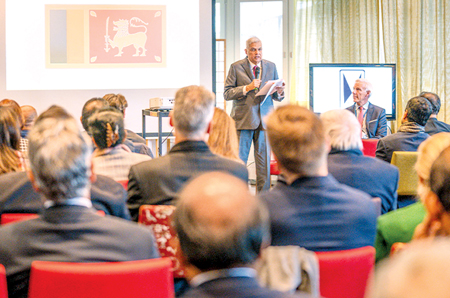
President Ranil Wickremesinghe addressing a business
forum in Davos
President Wickremesinghe’s attendance at the World Economic Forum (WEF) and affiliated events proved to be a strategic masterstroke for Sri Lanka. His active engagement went far beyond showcasing the country’s economic vision. Through insightful exchanges and deft planning, he forged valuable connections with influential figures, from economic powerhouses to industry titans. These newly established bridges opened doors for potential future investments and partnerships, promising to usher in a new era of economic prosperity for Sri Lanka.
This decisive move by President Wickremesinghe was not merely a tactical play; it was a powerful declaration of Sri Lanka’s intent. His presence on the WEF platform was not passive observation; it was an active claim to a seat at the global dialogue table. By confidently outlining Sri Lanka’s futuristic economic reform process to world leaders, he sent a clear message: Sri Lanka was no longer content to be on the periphery of the international arena; it was ready to be a driving force, shaping the global conversation and carving its own path to success.
This strategic participation at the WEF served as a turning point for Sri Lanka. The future may still hold its share of challenges, but there is no denying that President Wickremesinghe’s bold moves at Davos has placed Sri Lanka firmly on the map, its economic future brimming with newfound possibilities.
Non-Aligned Movement
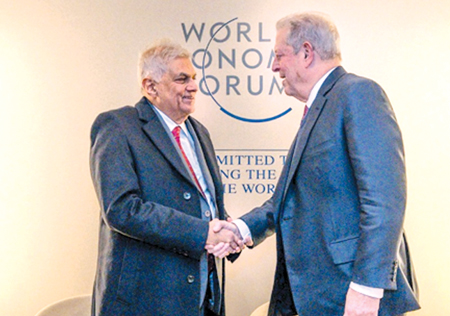
Meeting former US Vice President Al Gore
The 19th Leaders’ Session of the Non-Aligned Movement (NAM) Conference, held in Kampala, Uganda, under the theme of “Expanding Cooperation for Shared Global Prosperity,” offered a critical platform for Sri Lanka to advocate for collective action among non-aligned nations. President Wickremesinghe seized this opportunity to emphasise the importance of working together to shape a shared, prosperous future for these countries.
President Wickremesinghe’s address touched upon several pressing global issues, including the plight of the Gaza Strip and the ongoing conflict between Israel and Palestine. He also delved into the challenges faced by developing nations, particularly those related to debt, climate change, and access to technology. The digital and technological divide, he argued, has exacerbated existing inequalities between developed and developing countries.
To overcome these challenges, President Wickremesinghe stressed the need for a strong and united NAM. He called for urgent action to address problems hindering progress, emphasising that such efforts are not solely in Sri Lanka’s best interest but rather serve the collective interests of all non-aligned nations. By pooling resources and working together, the NAM can pave the way for a more equitable and prosperous future for its member states.
In essence, President Wickremesinghe’s message at the NAM Conference was one of unity and collaboration. He urged member countries to recognise their shared destiny and work in concert to overcome the obstacles that stand in their path to collective progress. Only through a spirit of cooperation and a commitment to common goals can the NAM achieve its vision of a fairer and more just world for all its members.
G77 + China
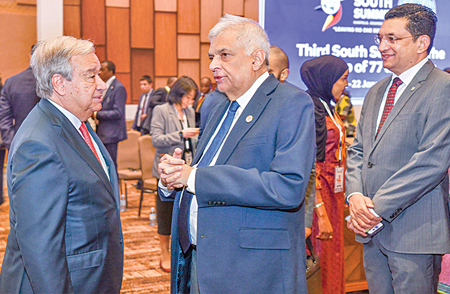
President Ranil Wickremesinghe with UN Secretary
General Antonio Guterres
The “G77 and China” group, representing 134 developing countries within the United Nations, provides a potent platform for the Global South. This alliance allows these nations to articulate their collective economic interests and address international issues on their own terms. Through mutual cooperation, they strive for sustainable development, poverty alleviation, and equitable trade and investment opportunities.
Recently, the group convened its third Southern Conference under the unifying theme “Leave No One Behind.” This gathering offered a vibrant space for member countries to collaborate on crucial global challenges, including climate change and the burgeoning digital economy.
During the conference, President Wickremesinghe addressed the need for immediate reforms within the global financial structure. He said the immense potential of the G77 and China to overcome collective hurdles, especially as the group celebrates its 60th anniversary. President Wickremesinghe further championed the importance of continuously amplifying the voice of the Global South.
Leveraging the third South Summit, President Wickremesinghe aimed to secure a brighter future for both Sri Lanka and its fellow member nations. He highlighted the essential reforms needed to achieve this vision, drawing the attention of world leaders to his proposed roadmap for a more equitable and prosperous world. His futuristic vision for global collaboration has indeed garnered considerable attention, offering a ray of hope for the developing world.
In essence, the “G77 + China” group represents a powerful force for collective progress. With the leadership of figures like President Wickremesinghe, this alliance has the potential to shape a more just and sustainable future for generations to come.
Sri Lanka and Africa: a longstanding friendship
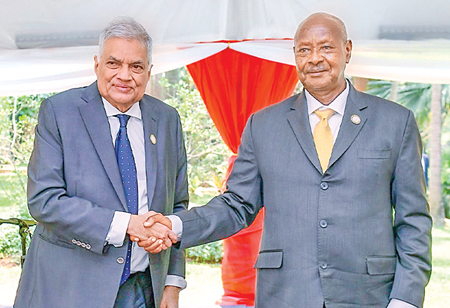
President Ranil Wickremesinghe with Ugandan
President Yoweri Museveni
The bond between Sri Lanka and the continent of Africa stretches back far into the past, woven together by centuries of cultural exchange and unwavering support. This unwavering bond manifested in numerous ways, including Sri Lanka’s steadfast opposition to Apartheid and racism across Africa throughout the 1950s to the 1990s. They consistently voiced their support for the Palestinian struggle, demonstrating a commitment to international justice and solidarity.
This dynamic friendship deepened further when Sri Lanka assumed the Presidency of the NAM during the 31st session of the UNs General Assembly in 1976. Under the leadership of the formidable Sirimavo Bandaranaike, Sri Lanka championed the cause of the NAM, forging stronger ties with Africa.
Through thick and thin, Sri Lanka and Africa have stood by each other. This enduring partnership translates into active diplomatic relations between the two, with Sri Lanka currently maintaining close ties with 42 African nations, six of which have Sri Lankan embassies.
More than just diplomatic connections, the relationship between Sri Lanka and Africa is steeped in mutual respect, shared values, and an unwavering commitment to justice and progress. It’s a story that continues to unfold, promising a future of continued cooperation and unwavering support between these two distant yet deeply connected regions.
The world is changing, and isolation is no longer an option. Global alignment has shifted, demanding collaboration and unity. President Wickremesinghe’s recent visit to Uganda exemplified this shift, showcasing Sri Lanka’s commitment to standing strong with the African region.
This strategic partnership is not just about navigating the current global challenges but also seizing the immense economic potential of the African continent. The global economic centre is no longer solely focused on North America and Europe; Asia and Africa are rapidly rising stars. Asian powers like India and China are increasing their economic clout, while African countries are pursuing ambitious development agendas like Agenda 2063.
This trend is attracting attention from both the Global South, led by Asia, and the Global North. Recognising Africa’s potential, Sri Lanka is strategically positioning itself as a central hub in the global economic chain. President Wickremesinghe’s financial, legal, and governance reforms aim to make Sri Lanka not just a major supply centre in Asia but also a key player in this emerging economic landscape.
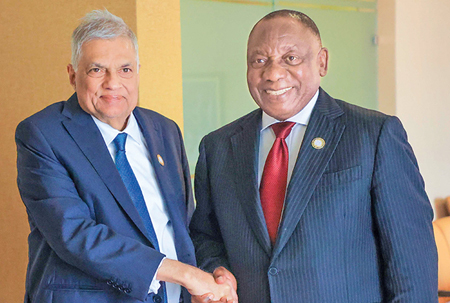
With South African President Cyril Ramaphosa
Africa is a force to be reckoned with. With the world’s second-largest landmass and population, it boasts 56 diverse countries actively engaged in trade and economic partnerships. By expanding these partnerships, Asia and Africa are poised to become the next economic powerhouses. President Wickremesinghe’s “Look Africa” policy reflects Sri Lanka’s desire to be part of this exciting future.
The rise of African economies has sparked a period of intense cooperation and mutual development, particularly with Asian economies. Trade, investment, technology, and development strategies are being actively shared, leading to a transformational shift. Sri Lanka, strategically located in the Indian Ocean, aims to leverage this growing relationship between Africa and Asia.
President Wickremesinghe’s visit to Uganda was not just a symbolic gesture; it was a strategic investment in the future. By raising awareness about Africa’s economic and investment opportunities in both Sri Lanka and African countries, it has laid the groundwork for stronger bilateral ties, increased trade, and mutually beneficial partnerships.
This new chapter in Sri Lanka’s foreign policy marks a commitment to standing strong with the African region. It is about recognising the immense potential of collaboration, leveraging shared strengths, and building a brighter future together. As President Wickremesinghe himself stated, “We must work together to unlock the immense potential of the African continent and to build a future of shared prosperity and progress.”







